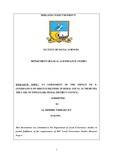Please use this identifier to cite or link to this item:
https://cris.library.msu.ac.zw//handle/11408/3694Full metadata record
| DC Field | Value | Language |
|---|---|---|
| dc.contributor.author | Breakfast, Gladmore Takudzwanashe | - |
| dc.date.accessioned | 2019-08-20T09:57:54Z | - |
| dc.date.available | 2019-08-20T09:57:54Z | - |
| dc.date.issued | 2017 | - |
| dc.identifier.uri | http://hdl.handle.net/11408/3694 | - |
| dc.description.abstract | It has now been widely acknowledged that e-governance is the universal remedy to the plethora of woes bedeviling service provision in most rural local authorities in Zimbabwe and even their urban counterparts. E-governance refers to information and communication technology based networks of administration and services that exists in the new public management era. Low revenue inflows, and corruption, low levels of citizen participation and old methods of record and database management are some of the challenges that are hindering local authorities to deliver quality services to the people. This study therefore seeks to give an assessment of how e-governance has been implemented in rural local authorities with the aim to address the above mentioned challenges using Tongogara Rural Council as a case study. The study is based on globalization, bureaucracy and the principal-agent theories defining how council deliver services to the people and various stakeholders. These theories provide the point of reference to compare the system of e-governance in Zimbabwe and those from Cape Verde and two cases from India. This helps the researcher to give a conclusion and make some recommendations. Questionnaires and interviews were employed to collect data from the respondents and this allowed the production of reliable and relevant results for the study. The study shows that the use of internet is very low among rural local authorities and their citizens thus making it difficult for them to fully implement e-governance. The introduction of e-governance can increase the speed of service delivery and at the same time reducing overcrowding at council offices. All this serves time and cost of service delivery by the council thus resulting in effective and efficiency. Some of the major findings of the study were that the council has limited finances to fully implement e-governance initiatives this has been witnessed by the unavailability of a council website. There is also lack of government support in order to implement the system of e-governance despite being encouraged to do so. The study concludes that rural local authorities have not shown their readiness in implementing e-governance initiatives in their day to day running of business. Therefore, the researcher recommends Zimbabwean rural local authorities to consider e-governance as the best medicine for their problems that affect service delivery. | en_US |
| dc.language.iso | en | en_US |
| dc.publisher | Midlands State University | en_US |
| dc.subject | E-governance | en_US |
| dc.subject | Service provision | en_US |
| dc.subject | Zimbabwe | en_US |
| dc.title | An assessment of the impact of e-governance on service delivery in rural local authorities: the case of Tongogara rural district council. | en_US |
| item.fulltext | With Fulltext | - |
| item.grantfulltext | open | - |
| item.languageiso639-1 | en | - |
| Appears in Collections: | Bsc Local Governance Studies Honours Degree | |
Files in This Item:
| File | Description | Size | Format | |
|---|---|---|---|---|
| final draft dissertation.pdf | Full Text | 795.15 kB | Adobe PDF |  View/Open |
Page view(s)
498
checked on Feb 14, 2026
Download(s)
708
checked on Feb 14, 2026
Google ScholarTM
Check
Items in MSUIR are protected by copyright, with all rights reserved, unless otherwise indicated.



